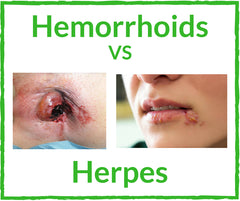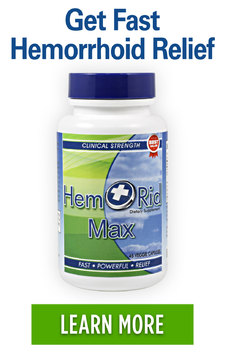Hemorrhoids vs Herpes - Discover If You Have Hemorrhoids or Herpes!
Posted on 17 June 2018 by Maryanne Johnson
Share this post
Do you have herpes or hemorrhoids? In this blog post, we'll discuss the difference between hemorrhoids and herpes in detail. If you have pain and are unsure of which one you have, fear not as we are here to help.
What Are Hemorrhoids and Herpes?
Hemorrhoids are a cluster of inflamed blood vessels and veins located inside the lower rectal area and outside the anal opening. Everyone has hemorrhoids, as they help transport blood vessels to the needed areas of the rectum, it is only when they become swollen and portray symptoms of inflammation that hemorrhoids become an issue.
If you have hemorrhoids, contact your doctor if these complications arise:
- Rectal bleeding or bright red blood in stools
- If a blood clot forms externally
- If a hemorrhoid becomes prolapsed
- If your hemorrhoids do not subside within a week
- If you are experiencing intense pain
Hemorrhoids Picture

Hemorrhoids are extremely common, especially for pregnant women and adults in their fifties or older. There are an estimated 10 million Americans who suffer from hemorrhoids each year.
There are two types of hemorrhoids, external and internal. External hemorrhoids are more troublesome, igniting symptoms of pain, itching, swelling, and burning.
Internal hemorrhoids are hardly felt and are unnoticeable sans occasional painless rectal bleeding.
Herpes comes from the herpes simplex virus (HSV) and is a sexually transmitted disease (STD), meaning the virus can be contracted through sexual contact like vaginal, oral, and anal sex.
You can contract a herpes virus through:
- Fluids exchanged during sex, semen or vaginal
- Infection through small, microscopic skin openings
- Childbirth, from an infected mother to child
- Transmitting by skin to skin contact
- Fluid of a ruptured herpetic blister
The herpes virus will remain in your system for life and symptoms are referred to as outbreaks.
Herpes Picture

Outbreaks are typically at their worse during the first year and can become more manageable after that. There are about 3 million cases of herpes in the United States per year and is considered to be one of the most commonly occurring STDs.
Unfortunately, there is no cure for this chronic virus. However, some medications can help manage outbreaks and symptoms. Some medicine is over the counter, and some can be prescribed.
How Do I Live With Herpes?
Upon being diagnosed with herpes, you may feel overwhelmed or even frightened by this STD. It is essential to remember that millions of Americans are diagnosed and leading normal, healthy lives with the herpes virus.
Herpes is one of the most common STDs and can managed and controlled with several different treatment methods. Keep in mind that prevention in spreading herpes is up to you, and there are plenty of actions you can take to avoid infecting any sexual partners.
Your doctor can test for herpes if you believe you have contracted the virus. Herpes appears in the form of sores and blisters, and if one is present during your exam, your doctor can perform a cell culture test to determine if it is herpes.
Alternatively, a blood test can be taken to examine your blood for traces of the virus accurately. The PCR blood test is the most common test and is extremely accurate in its results.
Herpes can be prevented by the following methods:
- Practicing safe sex by use of condoms
- Using a dental dam as a protective barrier
- Using antiviral medication to treat herpes
- Refraining from sex during a herpes outbreak
- Remaining abstinent of sex completely
What Causes Hemorrhoids and Herpes?
While research and studies have not determined an exact cause behind hemorrhoids, it can be concluded that these inflamed blood vessels are aggravated by a lack of fiber, and more specifically, constipation and straining on the toilet.
Age is also a factor for hemorrhoids, as well as sitting and standing for long periods of time, abnormal pressure on the rectal area (pregnancy and childbirth), and genetics also plays a role.
The causes of hemorrhoids include:
- Age
- Sitting and standing for long periods
- Straining on the toilet
- Constipation or frequent diarrhea
- Lack of fiber in the diet
- Lifting heavy objects
- Pregnancy and childbirth
Herpes is a sexually transmitted disease and can be contracted during anal, oral, and vaginal sex. Infected bodily fluids that are exchanged during intercourse can come in contact with an active legion and transfer the virus.
Semen, saliva, vaginal fluid, and the fluid of a herpetic blister can all be responsible for the transfer of the herpes virus if these fluids are infected themselves. The infection can be transmitted even by skin-to-skin contact.
The herpes simplex virus can travel by the fluid of an infected person through breaks in the skin of a non-infected individual, mucous membranes in the genital area, or even through microscopic abrasions. Prevention methods of the herpes virus include condoms, antivirals, and abstaining from anal, vaginal, and oral sex.
Herpes can also be spread through childbirth if the mother is infected. Newborns infected with the herpes virus can be severe and sometimes even fatal, and this is because of their days-old immune system.
There is still a risk if the prevention method is condoms, dental dams, or antivirals because you are again putting yourself in the way of exposure. Abstinence is the only 100% guaranteed prevention method for herpes.
What are Hemorrhoid Symptoms?
External hemorrhoids have more symptoms than internal hemorrhoids. External hemorrhoids form bumps around the anus that can itch, burn, and cause pain.
External hemorrhoids can become thrombosed, meaning a blood clot forms inside the inflamed vessel.
This is a painful occurrence, but blood clots will shrink by themselves, but if they require lancing or draining, a doctor should be consulted.
Internal hemorrhoids are only known to cause painless rectal bleeding, unless they become prolapsed, escaping through the rectum. While this can cause pain, a mild prolapsed hemorrhoid can be pushed back into the rectum or will retract on its own.
Hemorrhoids often produce these symptoms:
- Rectal bleeding
- A burning sensation
- Itchiness on or around the anus
- Small rubbery bumps
- Blood clots
- Pain and discomfort
- Prolapsed hemorrhoids
There are two types of herpes viruses, type one and type two. HSV-1 is known to cause symptoms and infections around the mouth, where HSV-2 commonly gives way to symptoms occurring in the genital regions. HSV-1 is referred to as oral herpes or cold sores, and HSV-2 is usually called genital herpes.
Many people confuse herpes with ingrown hairs, pimples, or even the flu.
The symptoms of genital herpes include:
- Blistering around the vagina, vulva, penis, anus, buttocks, or inside of the thighs
- A burning feeling during urination
- Difficulty urinating due to blisters causing blockage around the urethra
- Intense itching
- Pain surrounding the genital area
- Broken blisters that become open sores
If you are infected with HSV-2, then you may experience these symptoms as well:
- Swollen pelvic glands
- Swollen glands under the arms or throat
- Fever
- Chills
- Headaches
- The feeling of achiness
- Feeling lethargic
Oral herpes does not have as severe of symptoms as those of genital herpes.
HSV-1 typically produces these symptoms:
- Blisters around the lips known as fever blisters or cold sores
- Blisters inside the mouth
Cold sores usually last a few weeks and go away by themselves, even without treatment. While cold sores are annoying, they are typically harmless for kids and adults.
What are Treatment Methods for Hemorrhoids and Herpes?
Because hemorrhoids are so widely experienced, there are numerous treatment methods. Remedies range from solutions that can be tried at home to a more severe approach like surgeries, rubber band ligation, or sclerotherapy.
The Top 11 Treatments for Hemorrhoids Include:
- Sitz bath
- Hemorrhoid creams and ointments
- Hemorrhoid pills
- Hemorrhoid Supplements
- Drinking plenty of water
- Exercising regularly
- Hemorrhoid pillows for sitting
- Fiber supplements
- Fiber Gummies
- Hemorrhoid removal surgeries or non-operative treatments
- Hemorrhoid Suppositories
There are hundreds of creams designed to treat hemorrhoids and aid in the temporary relief of pain, itching, burning, and general discomfort.
Sitz baths, where just the lower body is submerged in warm water, can encourage hemorrhoids to shrink while alleviating symptoms.
The best method of prevention of both internal and external hemorrhoids is a fibrous diet.
If you want relief via fiber, try our Fiber Gummies or Fiber Supplement.
Get this Fiber Gummy for Hemorrhoids
The less straining that occurs while passing a bowel movement, the less chance that the blood vessels will become inflamed and incite a hemorrhoid flare-up.
Doctors will often recommend a soluble fiber supplement to soften and bulk stools if patients struggle to find their fiber naturally through whole foods.
Typically, doctors will only recommend surgical options if hemorrhoid flare-ups occur regularly and disrupt their patient’s lifestyle. Patients with severe hemorrhoids can ask their doctors about this treatment method.
Non-operative treatments like rubber band ligation are done in-office and under an hour. Rubber band ligation places a band around the base of an internal hemorrhoid, forcing it to lose its supply of blood and fall off.
There is no cure for herpes, but outbreaks can be treated with medication to make symptoms more manageable.
Some treatment methods for herpes include:
- Antiviral drugs
- Topical ointments and creams
- Natural extracts from plants
- Other alternative medicines
- Over the counter pain medication like Tylenol or ibuprofen
- Warm baths
- Applying ice to sores
Antiviral drugs prescribed by doctors promote a faster healing time for legions and sores. There are many antiviral drugs on the market, and they can also help control the frequency and length of outbreaks.
Other treatment methods include over the counter topical creams and ointments or pain relievers to reduce discomfort from sores and blisters.
At-home methods like warm baths, applying ice to irritated areas, and wearing loose clothing can all aid in alleviating pain and other uncomfortable herpes symptoms.
How Do Doctors Test for Herpes or Hemorrhoids?
Hemorrhoids are incredibly common, and often doctors can diagnose their patients with this anorectal disorder by listening to the symptoms and descriptions. To ensure that they are providing the proper diagnosis, doctors can also preform a visual or digital examination that take minutes to complete.
Similarly to hemorrhoids, a herpes test is only conducted when the doctor can determine if you are demonstrating the symptoms associated with this STD. Medical professionals conduct a swab test on the fluids to determine if the virus is present.








0 comments